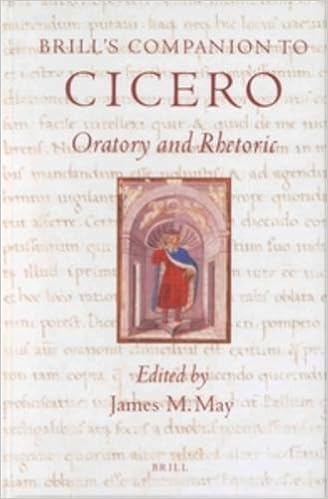The rhetoric which Donald Trump practices works partly because Trump is employing many of the same rhetorical strategies used by one of the greatest orators in history: Cicero. Marcus Tullius Cicero (106-43 BC) was born on January 3, 106 BC in the hill town of Arpinum, about 60 miles southeast of Rome. He won his share of elections and moved up the ranks of the Roman republic until he became consul, the highest office in the land, at a younger age than anyone ever had without coming from a politically connected family. He was the Kennedy or the Obama of first-century-B.C. Rome. He was a Roman philosopher, politician, lawyer, orator, political theorist, consul and constitutionalist. But he sounded a lot like Trump when it came to rhetoric. And he knew how to use it.
 When Cicero was attacking the corrupt governor Gaius Verres (see Brooklyn Law School Library’s 2011 e-book Cicero, Against Verres, 2.1.53-86), he used the rhetorical device of preterition, an unfamiliar word whose concept has become familiar this year. Preterition is when a speaker says he will not mention something, usually something unsavory. By naming the thing he will not mention, of course he has already planted the idea in his listeners’ minds. “Nothing shall be said of his drunken nocturnal revels; no mention shall be made of his pimps and dicers,” Cicero said about Verres. The list went on. Cicero rounded it out by saying, “The rest of his life has been such that I can well afford to put up with the loss of not mentioning those enormities.” If listeners didn’t know before about Verres’ liking for alcohol and prostitutes, they did now.
When Cicero was attacking the corrupt governor Gaius Verres (see Brooklyn Law School Library’s 2011 e-book Cicero, Against Verres, 2.1.53-86), he used the rhetorical device of preterition, an unfamiliar word whose concept has become familiar this year. Preterition is when a speaker says he will not mention something, usually something unsavory. By naming the thing he will not mention, of course he has already planted the idea in his listeners’ minds. “Nothing shall be said of his drunken nocturnal revels; no mention shall be made of his pimps and dicers,” Cicero said about Verres. The list went on. Cicero rounded it out by saying, “The rest of his life has been such that I can well afford to put up with the loss of not mentioning those enormities.” If listeners didn’t know before about Verres’ liking for alcohol and prostitutes, they did now.
Then there Cicero’s tactic of asking the audience a leading question – stirring up their enthusiasm as participants, and suggesting an answer that he cannot state himself. That sort of question is formally called anachinosis. Defending his friend Rabirius, who had a role in the death of a populist political figure, Cicero laid out the chaotic situation and asked, “What would you do in such a crisis? …. While the consuls were summoning you to uphold the safety and liberty of your country, which authority, which invitation, which party would you prefer to follow, whose command would you select to obey?” Cicero led his listeners to believe that, amid the tumult that led to the death, any one of them might well have acted just like Rabirius.
Then there is ecphonesis which we see in the exclamation at the end of Trump’s tweets. “O tempora! O mores!” (“The times! The customs!”) Cicero wrote in one of his most famous expressions, evocatively proclaiming his distress about society in just a few punctuated words. Trump deploys ecphonesis effectively and memorably when he ends his tweets, “Sad!”
 For more, see Brooklyn Law School Library’s 2002 e-book Brill’s Companion to Cicero: Oratory and Rhetoric intended as a companion to the study of Cicero’s oratory and rhetoric for both students and experts in the field: for the neophyte, it provides a starting point; for the veteran Ciceronian scholar, a place for renewing the dialogue about issues concerning Ciceronian oratory and rhetoric; for all, a site of engagement at various levels with Ciceronian scholarship and bibliography. The book is arranged chronologically and covers most aspects of Cicero’s oratory and rhetoric.
For more, see Brooklyn Law School Library’s 2002 e-book Brill’s Companion to Cicero: Oratory and Rhetoric intended as a companion to the study of Cicero’s oratory and rhetoric for both students and experts in the field: for the neophyte, it provides a starting point; for the veteran Ciceronian scholar, a place for renewing the dialogue about issues concerning Ciceronian oratory and rhetoric; for all, a site of engagement at various levels with Ciceronian scholarship and bibliography. The book is arranged chronologically and covers most aspects of Cicero’s oratory and rhetoric.
